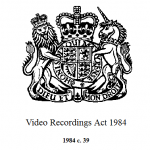Law Weblog
People remain convicted for offences under unenforceable Act
Saturday 30 January 2010 at 2:37 pm | In News | Post Comment The Video Recordings Act 2010, received Royal Assent last Thursday and it has produced a Constitutional Law anomaly.The Video Recordings Act 1984 made it a criminal offence to sell videos, DVDs and video games not in accordance with the correct classification certificate, for example to children or those that should only be sold in licensed sex shops.
However, Parliament enacted the 1984 Act in breach of the Technical Standards Directive, a European Community law that requires that the European Commission be consulted. This breach of EU law made the 1984 Act unenforceable. It is unheard of for an Act of Parliament to be legally unenforceable.
From September prosecutions stopped, and appeals have been unopposed by prosecutors.
Last week Parliament revoked and re-enacted the 1984 Act. The new Act does not have retrospective effect, so those accused of offences last month cannot be prosecuted under the 2010 Act.
What is not known is what will happen to those who were prosecuted and convicted under the 1984 Act and who are out of time to appeal, should their convictions now be revoked as not being in accordance with law?
Courts will not set aside convictions unless there are exceptional circumstances and there has been a substantial injustice. It is almost certain that these events will find a place in all constitutional law textbooks
New offence for under-18s of persistently possessing alcohol in a public place
Saturday 30 January 2010 at 9:23 am | In News | Post Comment From 29 Januayr 2010, police have new powers to tackle underage drinking, including making it easier for them to confiscate alcohol, move on groups of teenagers causing trouble and stop retailers selling to underage children.The powers, introduced through the Policing and Crime Act 2009 include:
– confiscating alcohol from young people – by amending police powers to confiscate alcohol so that they no longer need to prove that the individual ‘intended’ to consume the alcohol;
– extending the police’s ability to issue ‘Directions to Leave’ so that they can be issued to people aged 10-15; and
– introducing a new offence for under-18s of persistently possessing alcohol in a public place;
– changing the offence of persistently selling alcohol to under 18s from three strikes within three months to two strikes in the same period.
Also coming into effect on 29 January are new powers for local councillors to tackle problem premises. In addition to the police and members of the public, local councillors will now also be able to call for a review to restrict or remove an alcohol retailer’s licence.
Sara Payne’s National Victims Service
Saturday 30 January 2010 at 1:50 am | In News | Post Comment The relatives of manslaughter and murder victims have been promised they will be the first to benefit from a new £8m support scheme.The National Victims Service will offer victims a dedicated support worker to help them get access to any assistance they need.
The service is being created in April following the report from Sara Payne.
The service will make support for victims a “core function” of the criminal justice system rather than an “optional add-on”.
“It is a pity that it has taken the common sense approach of a mother who lost her young daughter in tragic circumstances to tell the government the direction it needed to take on this issue
David Howarth MP
“This re-heated announcement only highlights the gulf between this government’s promises and its action.
However Dominic Grieve MP
“Gordon Brown has let over 70,000 criminals out of jail early, and plans to force through lighter sentences for serious criminals – what kind of justice is that for victims?
Mrs Payne – who is recovering after suffering a brain aneurysm before Christmas – published her report calling for the new service after spending nine months speaking to victims and witnesses and studying front-line services.
Her eight-year-old daughter Sarah was murdered in 2000 by known paedophile Roy Whiting.
In defence of the home and family, the debate (again)
Friday 22 January 2010 at 6:13 am | In News | 1 Comment The Lord Chief Justice, Lord Judge has restarted the debate over the force used in defence of the home and family.In commuting Munir Hussain’s 30-month prison term to a suspended sentence as an “act of mercy”, he said that the “call for mercy” on their behalf was intense and that the court had concluded that it “must be answered”.
But he stressed:
“This trial had nothing to do with the right of the householder to defend themselves or their families or their homes. The burglary was over and the burglars had gone. No one was in any further danger from them.”
File sharing may not be illegal
Sunday 17 January 2010 at 3:12 pm | In News | Post Comment The first, and may be the last trial for file sharing ended in acquittal this week. Prosecutors were unable to establish when downloading music breaks the law. They may never be able to, even with proposed new legislation.Alan Ellis, 26, ran Oink, one of the world’s largest music sharing websites, but Teesside Crown Court cleared him of conspiracy to defraud. Ellis received £11,000 a month in donations from people using the site. Oink had almost 200,000 members and facilitated the download of 21m music files between 2004 and 2007. Mr Ellis, a software engineer told the court he had no intention to defraud copyright holders, and he had developed the site to brush up on his computer skills. The prosecution was unable to show that Mr Ellis knew he was infringing copyright.
Prosecuting individuals who have downloaded just a few music files is costly and generates a lot of negative publicity for music companies. To prosecute successfully people who run file-sharing sites is all but impossible because there is no copyright violation; they do not hold any of the music files themselves, just the software.
Under the Digital Economy bill, internet service providers could be required to cut off web access from customers downloading large amounts of material illegally in the unlikely event that they were able to prove illegal downloading.
Sean Hodgson may receive millions in compensation
Friday 15 January 2010 at 9:38 pm | In News | Post Comment In 2008, Sean Hodgson’s conviction for killing Teresa De Simone, 22, in Southampton in 1979 was quashed after new DNA evidence came to light.Miss De Simone’s body was found in the back seat of her Ford Escort in a car park beneath the Tom Tackle pub.
Suspected of her killing, Mr Hodgson confessed to her murder at the time of the original inquiry but pleaded not guilty at his trial in 1982, where his defence team said he was a pathological liar.
In 2008, DNA revealed David Lace as the suspected killer. Lace, who confessed to the murder in 1983, killed himself in December 1988, aged 26.
Mr Hodgson could be in line for the maximum £1m compensation from the MoJ, while further planned action against the Forensic Science Service (FSS) and Hampshire police could also top more than £1m.
Mr Hodgson has received a £200,000 interim payment from the MoJ following his release, although his access to the cash is limited for his own protection.
Stop and search powers under Sections 43 and 44 of the Terrorism Act 2000 to continue, despite ECHR ruling
Friday 15 January 2010 at 9:23 pm | In News | Post Comment Judges at the European Court of Human Rights on Tuesday found that the use of anti-terror laws to stop and search people without grounds for suspicion was a breach of their human rights.The ruling was in response to case brought by two people who were searched by police near an arms fair in London’s Docklands in 2003. Their case challenged the police’s right to conduct searches under Section 44 of the Terrorism Act 2000.
But police insisted they would ignore the ruling and that the use of Section 44 would remain in force “in specified locations across London” including major landmarks and “crowded places”.
And Home Secretary Alan Johnson said the government would appeal against the ruling.
“The threat remains real and serious, and stop and search can deter and disrupt terrorist activity and create a hostile environment for terrorists. Protecting the public remains our priority.”
The Conservatives on Wednesday said they would seek to ban the indiscriminate use of counter-terrorism laws by police.
In a unanimous ruling, seven judges said the searches could cause “humiliation and embarrassment” and breached the complainants’ right to respect for their private life under Article 8 of the European Convention on Human Rights.
Journalist Pennie Quinton, 38, and protestor Kevin Gillan, 32, brought the case to the European court after being stopped and searched by police in September 2003 on their way to a demonstration near an arms fair held in east London.
Quinton, who is a journalist, was ordered to stop filming in spite of the fact that she showed her press card, and Gillan was wearing a rucksack and riding a bicycle when he was stopped on his way to the demonstration.
Between 2004 and 2008 the number of searches recorded by the Ministry of Justice went from around 33,000 to over 117,000, it said.
The Jackson Report long-awaited, worth waiting for
Friday 15 January 2010 at 9:16 pm | In News | Post Comment Significant reforms should be introduced to prevent litigation costs from spiralling, Lord Justice Jackson announced this week as he unveiled his long-awaited review into the cost of civil litigation.Jackson LJ who spent a year reviewing rising civil litigation costs, has outlined a series of proposals aimed at increasing competition and thereby reducing fees.
The key recommendations include:
* Success fees and after-the-event insurance premiums should cease to be recoverable in conditional fee arrangements (CFAs)
* Success fees in CFAs should be capped at 25 per cent of damages and awards of general damages raised by 10 per cent
* The use of referral fees should be banned
* A contingency fee model should be introduced, but these must be properly regulated and an independent lawyer should advise on what structure it will take
* Judges, litigators and barristers should receive training on costs budgeting
* A standard costs management procedure should be established
* Increased judicial responsibility for controlling costs
The reforms will hit personal injury practitioners hard, but could also be applied to clinical negligence, judicial review and defamation claims.
“Access to justice is important not only for claimants who have valid claims, but also for defendants who have a valid defence,” Jackson LJ said.
Big ticket litigation will be largely unaffected, although Jackson LJ proposed that disclosure in large commercial cases should be conducted on a ‘menu’ basis.
Lord Chief Justice Lord Judge and Master of the Rolls Lord Neuberger have given their full backing to the Jackson report. Commentators are saying that this excellent report will secure his future in the highest echelons of the judiciary.
Means testing for defendants in The Crown Court
Thursday 14 January 2010 at 7:38 am | In News | Post Comment People acquitted of crimes will not be able to claim back all the legal costs of their defence at five crown courts in England and Wales, starting this week.Means testing in the courts could affect one in four defendants acquitted of serious criminal cases. The Law Society holds the view is that the new regulations are unlawful and successful defendants should be entitled to reasonable compensation for costs they have incurred; they are to challenge the government.
There is now a cap on the amount acquitted defendants can claim back. Under the scheme, defendants who pay for private representation can only be reimbursed at legal aid rates, even though private lawyers often charge more.
There is no cap on the amount prosecutors can claim if defendants are convicted. And prosecutors’ costs can work out at much more than legal aid rates.
Critics hope that the judicial review claim, which has been filed at the high court in London, will lead to the measures being scrapped.
The reforms were brought in following high profile cases of very wealthy defendants quite capable of funding their defence employing very expensive legal teams.
A trial with no jury first for 400 years – next week
Saturday 9 January 2010 at 7:42 am | In News | Post Comment Defence lawyers are preparing to challenge the first criminal trial in England and Wales for 400 years to go ahead without a jury. The case is expected to be heard next week.Lawyers for four men accused of being part of a gang that stole £1.75 million in a raid at Heathrow will seek to adjourn the trial and go before the Supreme Court.
The decision that there should be a judge-only trial was made by the Lord Chief Justice and two other judges in an historic ruling at the Court of Appeal in June after claims of jury nobbling. The jury-less trial is the first of its kind under the provisions contained in the Criminal Justice Act 2003 to prevent jury nobbling. The only other judge-only trials for serious cases, known as Diplock trials, have been in Northern Ireland.
The trial will go ahead before Mr Justice Treacy in the Royal Courts of Justice, rather than a criminal venue such as the Old Bailey,
A series of special arrangements and procedures are being devised for the trial because of the absence of a jury. The judge is expected to follow some of the procedures developed in the Diplock courts. First, the trial is expected to be far shorter and is listed for three months, whereas the last trial to collapse had already run for six months and reached only the end of the prosecution case and the judge will have available before him all the witness statements–juries have no such access.
Although there will not be the huge and costly security arrangements that would have been in place to protect a jury, the judge will probably have enhanced security.
Powered by WordPress with Pool theme design by Borja Fernandez.
Entries and comments feeds.
Valid XHTML and CSS. ^Top^









